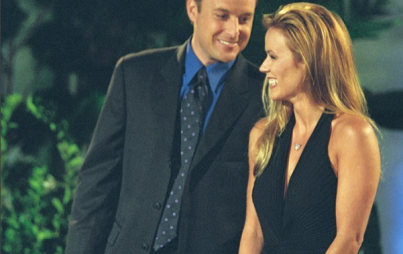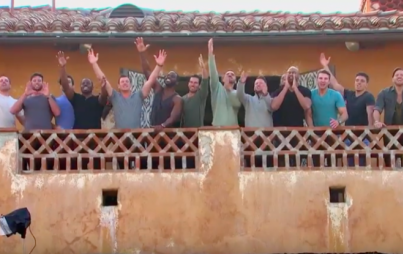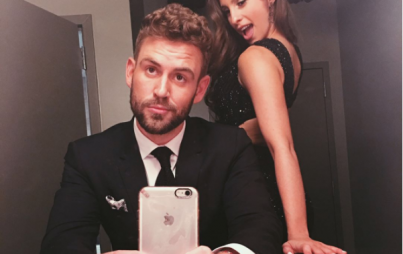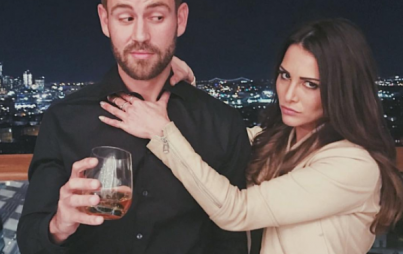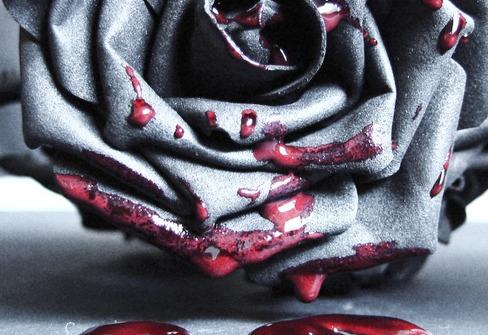
Credit: deviantart
We all have our vices, and for many years, mine has been The Bachelor—a show I find absolutely riveting despite, or maybe because of, the fact that it offends every one of my feminist/intellectual sensibilities. In the history of the show's can't-look-away trainwrecks, few have been more disastrous than the relationship between Juan Pablo Galavis and Nikki Ferrell.
Today comes news that this detested, deplored couple has broken up. And both their relationship, and its demise, illustrate a frightening fact about this show I love to hate: The Bachelor is basically The Hunger Games.
Let The Games Begin
Let's back up several months, to the moment when Juan Pablo chose Nikki on the emotionally fraught season finale of The Bachelor. In the episode, Juan Pablo earned the ire of a nation when he did the unthinkable: He didn't propose to Nikki—or even say he loved her.
Immediately following the finale, something quite amazing happened: On After the Final Rose, during which the "winners" typically gush about their great love and effusively thank the show for helping them on their "journey" to "happily ever after," Juan Pablo openly retaliated against the show and everything it stands for, explicitly revealing the show's Hunger Games undertones.
Yes, The Hunger Games' Katniss Everdeen is more likable than Juan Pablo (who has done some truly questionable things), and yes, the stakes are much more dire in The Hunger Games . . . but in many ways, the similarities are striking.
In The Hunger Games, 24 contestants are selected to fight in an arena, where they face cruel and unusual challenges masterminded by mysterious gamemakers. On The Bachelor/Bachelorette, 25 contestants are selected to fight for love in an L.A. mansion, where they face cruel and unusual challenges masterminded by mysterious TV producers.
In both, the eventual victor uses a combination of conniving and physical skills (brute force in the Hunger Games; carefully exposed abs and boobs on The Bachelor) to emerge as the winner, after which the gamemakers/producers use them as a marketing ploy to keep interest in future games strong.
This all goes wrong in The Hunger Games when Katniss—skeptical, cool, honest to a fault—pulls her suicidal berries stunt and calls into question the very premise of the game. In The Bachelor, this all goes wrong when Juan Pablo—skeptical, cool, honest to a fault—doesn't propose to or say "I love you to" to Nikki, calling into question the very premise of the show.
Katniss is punished for not "following the script" by enduring a public smearing. So is Juan Pablo, who definitely received one of the harsher edits in Bachelor history.
On After the Final Rose, this battle between puppet and puppetmaster was obvious and riveting. Host Chris Harrison—an overly made-up, slickly affable Caesar Flickerman doppelganger if there ever was one—needled Juan Pablo tirelessly to tell Nikki he loved her, which Juan Pablo rebuked with open contempt. At one point, Harrison pushed for him to reveal a "surprise," presumably an announcement of his love and/or proposal, to which Juan Pablo responded with something along the lines of "I already talked to the executives, and that's not going to happen." Nikki fought back too; when Harrison asked her how long she would wait around to hear "I love you," she said, her eyes narrowing, "There's no timetable for something like that."
Past "victors" were asked to weigh in, and in one particularly chilling moment, Catherine—she of the recent televised wedding to previous Bachelor Sean—told the off-script couple, "You don't bite the hand that feeds you."
After The Mansion/Arena
Following the show, producers did their best to perpetuate the idea that Nikki and Juan Pablo deserved our scorn, punishing them further for disobedience while making it clear their repudiation of the show would not be tolerated. After the finale, Harrison told Entertainment Tonight, with faux exasperation:
"The end goal of our show is to end up with a couple, and I felt like, wow after all of this, we did it—we have a couple who loves each other—but he just wouldn't give, and he just won't, and I don't know why. I don't know where all the anger, and all the angst, or reservations come from, I don't know . . . throughout it, I feel like he was his own worst enemy."
In addition to lambasting Galavis for having "reservations" about his love life being controlled by omnipotent, ratings-hungry producers, Harrison also bemoaned Galavis' decision to sneak kisses with girls "off camera." (The gall!)
And here's the scary part: Like Capitol loyalists, most people followed right along with the producers' "anti-Juan Pablo/Nikki" narrative, siding with the powerful gamemakers over the powerless contestants. A month after the finale, Nikki took to Instagram to defend her relationship in the face of mounting backlash from, let's be clear, people who don't know her at all.
Sure, the couple brought some of the subsequent ire on themselves; a decision to appear on Couples Therapy, for instance, came off as fame-hungry. But even that may have been a perfectly genuine attempt to save a crumbling relationship.
Now, as they deal with their break-up in the public eye, the world continues to treat Nikki and Juan Pablo with scorn.
"Worst 'Bachelor' Ever Juan Pablo Galavis Splits From Nikki Ferrell," read one headline in the aftermath of the split.
"SURPRISE! Juan Pablo Galavis and Nikki Ferrell Split," snarked Celebuzz.
In the great game of reality TV, it's the gamemakers/producers who have won and continue to win. By forcing real people to follow a script market-tested for success, and turning the audience and media against anyone who dares defy that script, the puppetmasters of reality TV have made us choose a thirst for entertainment over compassion for real lives at stake.
It doesn't get more Hunger Games than that.


